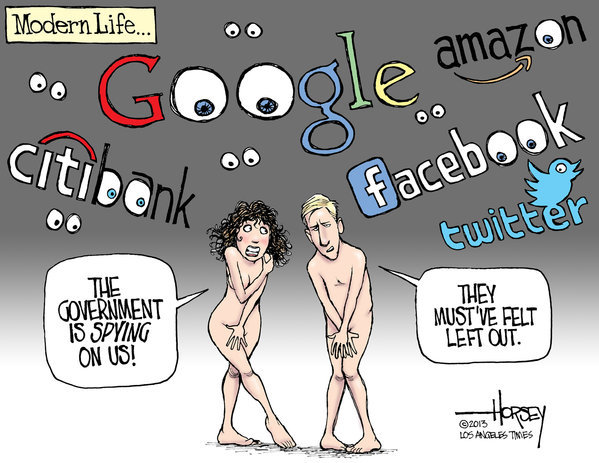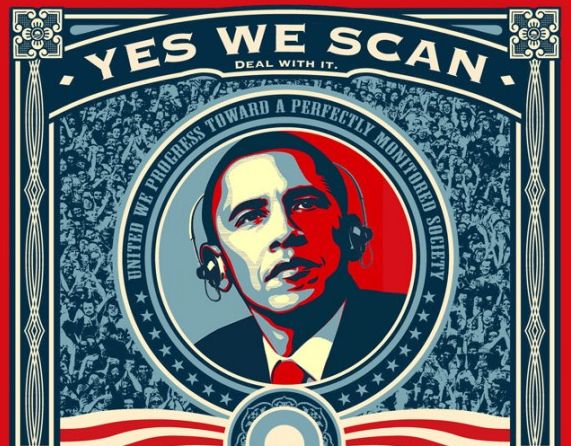In principle, the National Security Agency’s vast data collection operation is troubling, but, in the age of Google and Facebook, it feels like having just one more Big Brother in a growing family of Big Brothers. In response to the revelation that the NSA is scooping up metadata on every call placed on Verizon, the American Civil Liberties Union has filed a federal lawsuit against chief members of the Obama administration’s national security team. The ACLU’s deputy legal director, Jameel Jaffer, said, “This dragnet program is surely one of the largest surveillance efforts ever launched by a democratic government against its own citizens. It is the equivalent of requiring every American to file a daily report with the government of every location they visited, every person they talked to on the phone, the time of each call, and the length of every conversation.”
 Look, I hate someone looking over my shoulder as much as, if not more than, Joe Sixpack. You’ll have to pardon me, though, if I don’t join in the collective “HOW DARE THEY??” that seems to be the freakout du jour. The news that the National Security Agency (NSA)
Look, I hate someone looking over my shoulder as much as, if not more than, Joe Sixpack. You’ll have to pardon me, though, if I don’t join in the collective “HOW DARE THEY??” that seems to be the freakout du jour. The news that the National Security Agency (NSA) can tell if we go #1 or #2 in our bathrooms has access to vast amounts of data about our electronic activities shouldn’t have taken anyone by surprise. And, despite the wingnut Right’s attempt to blame this on The Black Guy in the White House ©, this program isn’t part of some new and uber-insidious plot to trample our liberty.
In the electronic age, surveillance is the price we pay for access. For those of you freaking out about the NSA monitoring your calls or whatever else they may (or may not) be doing, think about this: what do you think happens every time you give your credit to a server at a restaurant? What becomes of your information? You might (but really shouldn’t) be surprised to learn that very little of our lives are really and truly private. If you have a free email account, you ceded your right to privacy the moment you clicked the ACCEPT button on the provider’s Terms of Service Agreement.
The only way to have anything close to privacy is to stay off the Internet, pay cash for your purchases, have no installment debt, and live in a school bus buried somewhere in Idaho’s Sawtooth Mountains. Or at least that’s what I used to think; turns out that really isn’t going to work, either.
Fast-forward to the set of CNN’s “Parker Spitzer” a couple of years ago when I asked Google chief executive Eric Schmidt what options were available to people (like me) who might find his “Street View” a little creepy.
“You can just move,” he said.
Well, no, you can’t.
This is our deal with the Devil. We want speed, convenience, selection, availability, and- most importantly of all- information..and those are all wonderful things. F’rinstance, the Internet has allowed me to reconnect with old college, high school and even junior high school friends. It affords me the opportunity to keep track of events in corners of the world that few Americans know, much less care, about. In many ways, our world is much smaller and far more interconnected than it was just a couple generations ago.
The wonderfulness that is the Internet doesn’t come without a price, which is normally paid in the form of our personal information. Google didn’t get to be the world’s 800-kb. gorilla by focusing first and foremost on “not being evil.” They took the personal information their users made available when they clicked ACCEPT and sold it to those with products and services of their own to sell. This is what allows us to continue to do so much for so little cost. We’ve become so addicted to the “free” stuff on the Internet that we’re willfully and completely ignorant of the cost involved in producing the content we take for granted.
If it’s true that every action has an equal and opposite reaction, welcome to the proof of that theorem.
When content providers begin to bill me and demand that I disclose deeply private information I’d prefer not to, then I might have cause to rebel. Until then, our unspoken pact with the Devil we know is that we get free stuff AFTER we agree to provide personal information. Civil libertarians might not like that arrangement, but such is the way of the world. Everything has its price and there’s truly no free lunch.
Then again, if you still have a problem with this arrangement…well, Idaho really is beautiful this time of year.
The other question we need to ask ourselves is how to balance privacy and security? Defeating terrorism requires information, and sometimes collecting information may mean doing so in dragnet fashion. So the NSA has access to an incomprehensible amount of cell phone metadata (among other things). Does that represent unreasonable search and seizure, a violation of our 4th Amendment rights? Or must we accept that sacrificing some privacy may mean greater security? Given that there’s no such thing as absolute privacy or absolute security, where should a balance be struck? Can such a balance even be found?
I’m not going to pretend to have the answer, but this is a conversation we need to have collectively. Ben Franklin once said that those would sacrifice liberty for security deserve neither. Unfortunately, the world we live in requires that we discuss where such a balance lies.
We’re being watched. Quelle surprise.


